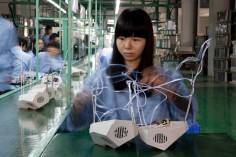Cohen Van Balen
source: cohenvanbalen
Revital Cohen and Tuur Van Balen run a London based experimental practice that produces fictional objects, photographs, performances and videos exploring the tensions between biology and technology.
Inspired by designer species, composed wilderness and mechanical organs, they set out to create posthuman bodies, bespoke metabolisms, unnatural animals and poetic machines.
.
.
.
.
.
.
.
source: fastcodesign
“A laborer over the course of an 8-hour day can sustain an average output of 75 watts.”
That fascinating quote is from Marks’ Standard Handbook for Mechanical Engineers. Something of a bible to mechanical engineers, it’s easy to interpret that line morbidly. After all, we live in an era in which most of our gadgets are made on assembly lines, where human beings are treated like nothing more than crude batteries made of flesh and bone.
But as anyone who has ever seen purple filaments lick their hand when touching a plasma globe knows, the generation of electricity can be a beautiful thing–a strange, hypnotic dance with a rhythm all its own. Why can’t this same thing be true for the electricity generated by humans working an assembly line?
That’s the idea behind 75 Watt, a new project by London-based studio Cohen Van Balen. It’s like a plasma globe dropped over Foxconn.
Cohen Van Balen is made up of Tuur Van Balen and Revital Cohen, two designers who have long shown a fascination in the tension between biology and technology (previous projects include a pigeon that could manufacture soap through defecation, and a series of organ replacement machines that have been networked together to form a semi-biological circuit). With 75 Watt, though, the duo wanted to examine a different sort of tension: this time in the context of mass-manufacturing.
In 75 Watt, workers on a nondescript Far East assembly line are shown assembling an existential MacGuffin of a gadget: a nonsensical object that does absolutely nothing. But that is not to say it is purposeless.
“The only function of the object being built is to choreograph its own assembly,” Van Balen tells Co.Design. “All of its dimensions, components, and materials are designed to create specific movements when they are put together.”
In a sense, then, the movement of the assembly workers is the product being built. As each line worker in 75 Watt picks up the gadget being constructed and does their small part in piecing it together, their precise, repetitive, and fragmented motions become an intricate, electrically charged dance.
75 Watt was shot on location in a Thermopot factory in China over the course of three days, with 15 actual line workers appearing in the finished film. Finding a suitable location was by and large the most difficult aspect of putting together the project.
“Because of the logic of mass-manufacturing, every minute on an assembly line is worth a lot of money, and we didn’t have the budget to compensate factories for this,” remembers Van Balen. “In the end, we were lucky to find a culturally minded factory manager, who we were lucky to convince after some Chinese business/dinner rituals.”
Although it might be tempting to see 75 Watt as an indictment of modern mass-manufacturing, Van Balen says that was not the intent. “Why would I be qualified to indict mass-production facilities, or consumer culture for that matter, when I’m as much a part of the problem as anyone else?”
We are all connected to the objects that come out of factories, no matter what side of the assembly line we are on. What 75 Watt seems to show, however, is that that the product that unites us in the middle–whether an iPhone, a Thermopot, or a nonsensical MacGuffin–is something that we have all decided to choreograph our lives around, and this is a choreography that can be strange and beautiful indeed.


